
Professor Philip V. Bohlman recently published "Wie sängen wir SEINEN Gesang auf dem Boden der Fremde! Jüdische Musik des Aschkenas zwischen Tradition und Moderne" (How Do We Sing the Lord’s Song in a Foreign Land? Jewish Music in Ashekenaz between Tradition and Modernism)
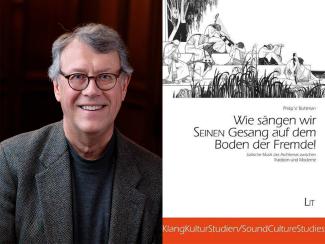
Philip V. Bohlman’s most recent study of European Jewish music encompasses the music of Ashkenaz—the culture of Jewish Europe—by placing it across modern historical metaphors for biblical Mesopotamia, the two rivers of Babylonian exile, which provide the basis for the powerful song of exile, Psalm 137, “By the Waters of Babylon.” It is that psalm, taken from the twentieth-century German Jewish translation of the Bible by Martin Buber and Franz Rosenzweig, which gives this book its title and narrative structure: each chapter takes several verses of the psalm to give it historical meaning, allowing the book to unfold across the accumulated meanings of Psalm 137 in the course of over two and a half millennia. Throughout the book, Bohlman looks closely at the lives of individual musicians and their agency in the creation of history. Cantors and cabaret players alike move across the pages, as do klezmer musicians sounding the folk music of everyday worlds of Jewish villages in European borderlands, and the great modernist composers, whose transit across stylistic borders rerouted the path of modern music history. The modern musics in the book emerge as a chronicle of tragedy and survival, narrating a history that stretches from the rise of modernity, passes through the Shoah, and acquires transcendent meaning in our own time.
Associate Professor Seth Brodsky publishes Portable Gray as Director of Gray Center for Arts & Inquiry
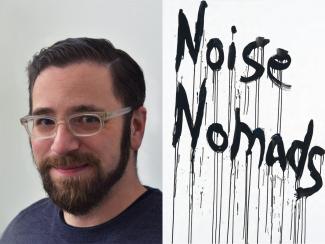
Portable Gray, the Gray Center’s magazine, is interdisciplinary in scope and dedicated to groundbreaking approaches, offering a forum for artists and scholars to consider how experimental collaboration can enrich their practices and foster new discoveries. It is published twice annually by the University of Chicago Press under the leadership of Seth Brodsky as Executive Editor. The second issue, “Noise Nomads” published in the Spring of 2019, is on music and sound; the third issue, on “documents, plans, dreams, schemes,” was published in January 2020.
Assistant Professor Anthony Cheung has premiered four new works
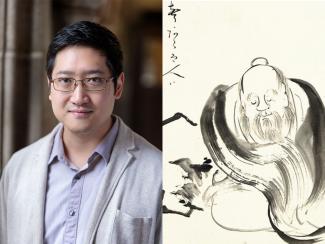
Since the summer of 2019, Anthony Cheung has premiered four new works. “The Natural Word” was co-commissioned by the LA Philharmonic and Ensemble Dal Niente and received performances at Walt Disney Hall and in Hyde Park last June. The work takes stock descriptive captions of sounds found in film and television as a starting point for musical transcription, depiction, soundtrack, and Foley, allowing for new interpretations of “known” sounds. It was made in collaboration with the scholar Sean Zdenek and visual artist Tristan Cook. “Double Allegories” was composed for the Grossman Ensemble of the Chicago Center for Contemporary Composition and evokes senses, seasons, and other topics common to the history of allegory in visual art and music. “Chōmu” engages with the traditions of Noh theater and Japanese texts related to butterflies and their associations with the Zhuangzi “butterfly dream," written for Noh singer Ryoko Aoki and premiered in Tokyo in December. Finally, the piano concerto, “A line can go anywhere,” written for Ensemble Modern and soloist Ueli Wiget, premiered in Cologne in January. It draws a connection between the instrument’s materiality and sound and the wire sculptures of Ruth Asawa, which are flexible and fragile yet dense and hard, with shapes that are buoyant but also made of edges.
Professor Thomas Christensen publishes Stories of Tonality in the Age of François-Joseph Fétis

Thomas Christensen's newest book explores the concept of musical tonality through the writings of the Belgian musicologist François-Joseph Fétis (1784–1867), who was singularly responsible for theorizing and popularizing the term in the nineteenth century. Christensen weaves a rich story in which tonality emerges as a theoretical construct born of anxiety and alterity for Europeans during this time as they learned more about “other” musics and alternative tonal systems. Tonality became a central vortex in which French musicians thought—and argued—about a variety of musical repertoires, be they contemporary European musics of the stage, concert hall, or church, folk songs from the provinces, microtonal scale systems of Arabic and Indian music, or the medieval and Renaissance music whose notational traces were just beginning to be deciphered by scholars. Fétis’s influential writings offer insight into how tonality ingrained itself within nineteenth-century music discourse, and why it has continued to resonate with uncanny prescience throughout the musical upheavals of the twentieth and twenty-first centuries.
The Voice as Something More: Essays Toward Materiality, co-edited by Professors Martha Feldman and Judith T. Zeitlin, published in September 2019

In the contemporary world, voices are caught up in fundamentally different realms of discourse, practice, and culture: between sounding and nonsounding, material and nonmaterial, literal and metaphorical. In The Voice as Something More, Martha Feldman and Judith T. Zeitlin tackle these paradoxes with a bold and rigorous collection of essays that look at voice as both object of desire and material object.
Using Mladen Dolar’s influential A Voice and Nothing More as a reference point, The Voice as Something More reorients Dolar’s psychoanalytic analysis around the material dimensions of voices—their physicality and timbre, the fleshiness of their mechanisms, the veils that hide them, and the devices that enhance and distort them. Throughout, the essays put the body back in voice. Ending with a new essay by Dolar that offers reflections on these vocal aesthetics and paradoxes, this authoritative, multidisciplinary collection includes essays by Music Department faculty Steven Rings, Seth Brodsky, and Martha Feldman as well as alumni Marcelle Pierson (PhD '15).
(Photo credit: Jimmy and Dena Katz)
Film, Music, Memory was published in early 2020 by Professor Berthold Hoeckner
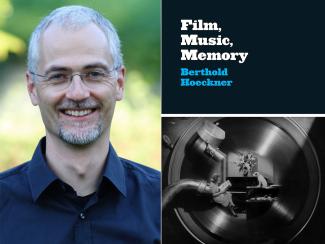
Film has shaped modern society in part by changing its cultures of memory. Film, Music, Memory reveals that this change has rested in no small measure on the mnemonic powers of music. As films were consumed by growing American and European audiences, their soundtracks became an integral part of individual and collective memory. Berthold Hoeckner analyzes three critical processes through which music influenced this new culture of memory: storage, retrieval, and affect. Films store memory through an archive of cinematic scores. In turn, a few bars from a soundtrack instantly recall the image that accompanied them, and along with it, the affective experience of the movie.
Hoeckner examines films that reflect directly on memory, whether by featuring an amnesic character, a traumatic event, or a surge of nostalgia. As the history of cinema unfolded, movies even began to recall their own history through quotations, remakes, and stories about how cinema contributed to the soundtrack of people’s lives. Ultimately, Film, Music, Memory demonstrates that music has transformed not only what we remember about the cinematic experience, but also how we relate to memory itself.
Assistant Professor Jennifer Iverson has published her first book, Electronic Inspirations: Technologies of the Cold War Musical Avant-Garde
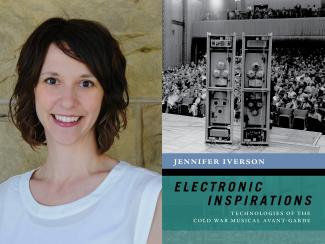
Jennifer Iverson’s Electronic Inspirations: Technologies of the Cold War Musical Avant-Garde traces the reclamation and repurposing of military machines, spaces, and discourses into the new sounds of the mid-century studio. The studio’s composers, collaborating with scientists and technicians, coaxed music from oscillators, generators, filters, and magnetic tape. For a decimated post-war West Germany, the electronic music studio at the WDR radio in Cologne was a beacon of hope. Electronic music—reverberating with anxiety as well as promise—is a quintessential Cold War innovation.
Sam Pluta has released a new album, MODULES, with Princeton University Composer Jeff Snyder
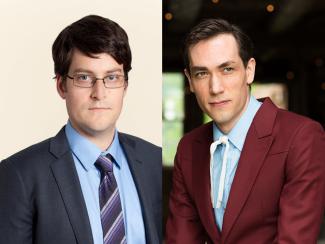
The electro-noise duo exclusiveOr, a collaborative project between UChicago Assistant Professor Sam Pluta and Princeton University composer Jeff Snyder, released MODULES in November 2019, marking 13 years of music-making between the acclaimed composer-performers. MODULES is a 40-minute tour-de-force ensemble work, bringing together three formidable powerhouses in experimental music: new-music stars International Contemporary Ensemble (ICE), bassoon-viola duo Architeuthis Walks on Land (AWOL – Katherine Young and Amy Cimini), and Pluta and Snyder. The result is an intense album-length work featuring virtuosic performances that seamlessly combine composed forms, electro-acoustic improvisation, noise, and lush harmonies.
The album can be found on all streaming platforms and on the Carrier Records website:www.carrierrecords.com
The Oxford Handbook of Critical Concepts in Music Theory, co-edited by Associate Professor Steven Rings and Alexander Rehding, was published in December
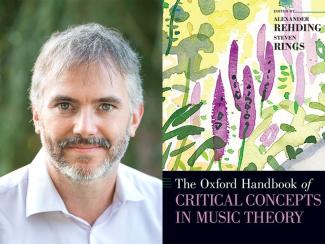
Steven Rings and Alex Rehding’s Oxford Handbook of Critical Concepts in Music Theory offers bracing new perspectives on terms music theorists thought they knew well. Music Theory operates with a host of technical terms that appear straightforward but that conceal layers of conceptual and historical complexity. This collection uncovers some of the richness and intricacy of these terms. Using a range of methods, from philosophical and historical contextualizations to cognitive and systematic approaches, these essays aim to convey a fuller understanding of the terms music theorists employ every day in teaching and research. In so doing, the collection takes the pulse of the discipline and lays out some possible paths into the future.
Four World Premieres for University Professor Augusta Read Thomas

In October of 2019, University Professor Augusta Read Thomas premiered her opera Sweet Potato Kicks the Sun, featuring award-winning beatboxer Nicole Paris and a libretto from Leslie Dunton-Downer, at the Santa Fe Opera. This was followed closely in November 2019 by the world premiere of the ballet The Auditions for the Martha Graham Dance Company. Upcoming premieres include Far Past War for chorus and orchestra, commissioned by the Cathedral Choral Society of Washington, D.C., to be premiered March 22 in the Washington National Cathedral, and Magic Gardens for string quartet, to be premiered by the Rolston String Quartet on April 26.
Other recent performances of Thomas’ work include Selene and Of Being is a Bird by soprano Claire Booth and members of the Philharmonia Orchestra (Pascal Rophé conducting), and Prayer Bells by the New World Symphony (Jeff Milarsky conducting). Thomas also composed the title work for University Carilloneur Joey Brink’s forthcoming album Ripple Effects, which features music by several UChicago composers.
Headline photo by Abhi Sharma used with permission through a Creative Commons License. Original photo available here.
